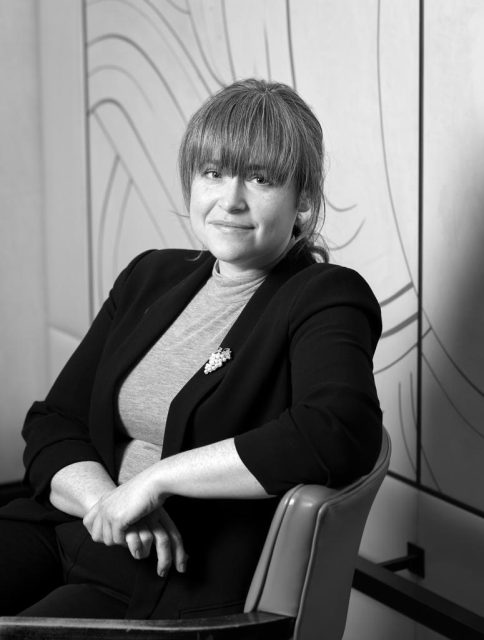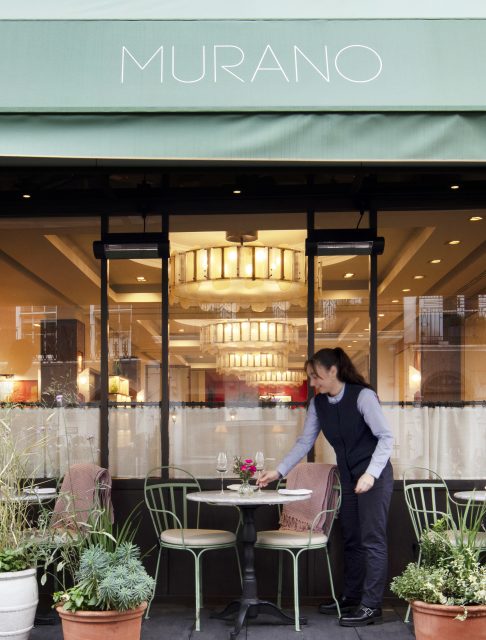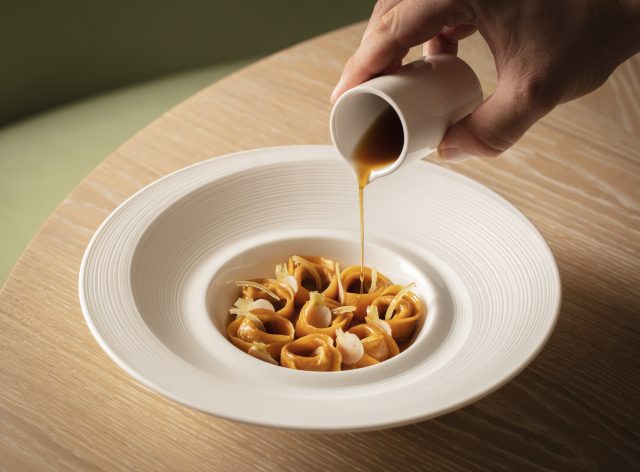This website uses cookies so that we can provide you with the best user experience possible. Cookie information is stored in your browser and performs functions such as recognising you when you return to our website and helping our team to understand which sections of the website you find most interesting and useful.
Unfiltered: Ali Finch, Murano
The group drinks buyer for Murano talks to Douglas Blyde about her first steps into the drinks industry, a love for Sherry, and the mission “to make beverages less mystifying”.

What was your first role in wine?
While studying philosophy, I needed a job to cover the cost of books (ahem, and nights out…) so I supervised bars for sporting venues including The Oval, Twickenham, Chelsea FC and Lord’s. The Lord’s Pavilion roof terrace was sponsored by Veuve Clicquot who provided training on the history of the region, the estate, and styles of champagne. It was the first time I really stopped to think about what was in the glass. WSET Level 2 followed, and wine took over my life.
When did you begin at Murano?
After a rocky few weeks as a waiter, I started as a commis sommelier in 2011 and, over the course of my first three years, progressed to Assistant Head Sommelier. I was fortunate to work alongside a stable and passionate team, so I learnt a huge amount about consistency, the importance of striving to improve yourself, discipline, and the concept of high-end hospitality. I left in 2014 to explore other areas of the industry, but in 2019 jumped at the opportunity to work together again, this time in a group role.
What is it like to work with Angela Hartnett?
It’s never boring! Angela always has a million things going on, which – for the most part – suits my brain’s need for variety. She cares deeply, and obviously has a huge amount of industry experience and contacts.
What are the highlights of your wine list at Murano?
It’s Italian-focused but covers all the key global regions. Our Northern Rhône offering is spectacular, showcasing the greats of Chave, Clape, and Allemand. We also champion Italian varietals in the New World, and a number of independent UK wineries.

Where is the sweet spot in value terms?
Places like Marche, Emilia-Romagna, and Abruzzo are frequented by fewer tourists than the more famous areas. As a result, they tend to show the authenticity and quality of the region at a fraction of the price you’d see elsewhere.
What is your favourite table at Murano?
Table 17 in the private dining area has a view of the chefs at work while being slightly elevated so you can see the whole restaurant. That being said, when I go out to eat, I prefer to face a wall so I can switch off my work brain!
How does the concept and wine list differ between the flagship Murano, and the Café Muranos in St. James, Covent Garden, and Bermondsey?
The key difference is that the Café lists are almost exclusively Italian in keeping with the menu. At Murano, the dishes are Modern European, so we have a little more room to play with. Also, being a Michelin-starred restaurant in the middle of Mayfair, there are a few big hitters from whom we have the luxury of holding multiple references and library stocks.
How do you source wines?
Roughly 90% of the lists showcase growers who work sustainably. I taste with my gut initially; if you can’t have a second glass or bottle, then it doesn’t make the cut. Afterwards, I will take a more clinical view as to what can fit, what might need to be delisted to make it work in terms of cellar space or list balance, and ultimately determine if it’s the right time to go with it. We’re fortunate to work with an amazing selection of suppliers who know how we operate and accommodate accordingly.
What style of wine could you happily live without?
Philosophically, I’d like to say goodbye to bulk, heavily manipulated wines which do little for the health of the planet and people who drink them, but then you run into issues around wine being exclusionary and elitist, which is the last thing we need as we seem to be turning a corner thanks to the rise of online-influencers, approachable literature, and less stuffy somms.
What deserves to be put in the spotlight?
Sherry. I took my FORTIFY team to Jerez last year, and it reignited my love for the region. It’s super value for money, and the knowledge and skill required to make the wines are incredible.
What is FORTIFY Wine & Spirits Co.?
A wine education and appreciation company which I founded in 2018 to provide WSET qualifications in wines and spirits, as well as bespoke informal courses for the on-trade. We also offer consulting services, and it’s a side hustle with a very deliberate intent to make beverages less mystifying and inspire people from within and outside the industry to unearth a passion and increase the likelihood that they will be more conscious of their future drink choices.
Do you deploy Coravin?
We offer a selection of wines under Coravin at Murano and are now introducing this to Café Murano as well. It’s also used to allow guests who want to effectively create themselves a half-bottle from the full list then take the remaining home.
What has been an embarrassing service mistake?
I once got the digestif trolley wedged between two tables, much to the joy of the restaurant director. Luckily, both tables saw the humour of the situation.

How hard is it to hire and keep sommeliers?
Recruitment-wise, patience is key. They can have huge knowledge and experience but not be compatible with how your business operates or what your guest demographic looks like. I’ve certainly been guilty of being too gung-ho in the past, and ultimately those hires don’t last. We’re lucky as I’m able to teach WSET courses internally, so that offers a nice point of difference for potential team members and encourages retention as you’re invested in their development. More than ever there is a need to focus on the individual needs and goals of each somm, have honest conversations as to what might be possible, and deliver on your agreed plans, as there’s always a new opening ready to sell them the dream. The Branson mantra “train them well enough that they can leave, treat them well enough that they want to stay” is imperative in this climate.
In your opinion, is the wine trade becoming a better space for women?
We have a female taxi policy, and internal mental health first aiders, and followed Hawksmoor’s lead to note on booking confirmations that we will not tolerate inappropriate behaviour from guests. I am grateful that the company has predominantly female management, meaning we can raise issues openly and identify changes to be implemented. However, the Curious Vines “Women in Wine” survey showed discrimination and harassment are still prevalent across the industry and there is a lot more to be done to increase diversity at leadership level, as this is what will drive further positive and inclusive change industry-wide in the future. The added bonus is that these types of change generally benefit everyone in the business and the overall bottom line.
If you could have a superpower, what would it be?
Teleportation.
Finally, who from history would you like to sit down to lunch with?
Sir Edmund Hillary and Sherpa Tenzing Norgay over a bottle of Clos Rougeard 2010 Les Poyeux.
Murano – 20 Queen Street, London, W1J 5PP; t. 020 7495 1127; enquiries@muranolondon.com; muranolondon.com
Related news

